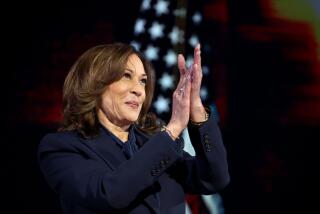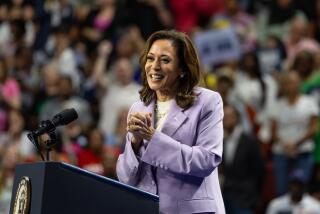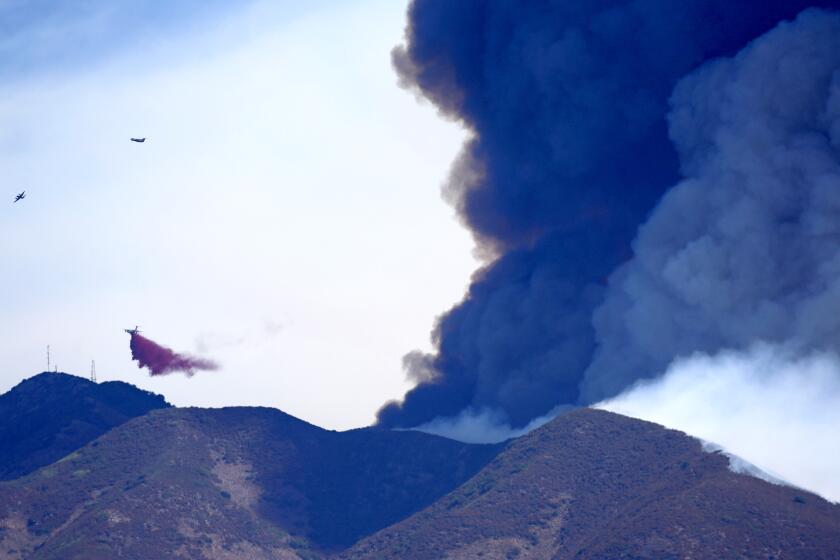Opinion: Will our first black president also be our last?
My father died in the fall of 2002, after a long battle with Alzheimer’s disease. In the spring of 2003, I was home in Chicago visiting my mother when a good friend invited me to go with him to a big, lavish dinner at a downtown hotel for a group he had represented as a lawyer. It would be a fun night out, a respite from dealing with my dad’s death and my mom’s loneliness.
When I arrived at the hotel ballroom, guests were buzzing. “You’ve got to see this guy who’s speaking tonight — Barack Obama,” said my friend. “He’s someone to watch.” Obama was a Democrat running for the Senate from Illinois, as I learned that very minute. Soon my friend had run into Obama’s campaign aide and introduced him to me, noting that I was an L.A. Times reporter. The next thing I knew, the aide had commandeered Obama and sat us both down at a cocktail table.
I was unprepared to shift suddenly into reporter mode and knew nothing about him beyond the fact that everyone in this room thought he was the hottest thing in Chicago. So we sat there and — as we all now know — Obama was not great at small talk and I was scrambling to think of questions, but somehow we cordially chatted for about 10 minutes before he was whisked away.
But he was on my radar — and in my email, since the aide took my email address and barraged me with constant updates on his campaign — and he’s never been off it since.
I watched him deliver the keynote speech at the 2004 Democratic Convention, and my heart leapt when he said, “There is not a liberal America and a conservative America. There is the United States of America. There is not a black America and a white America and Latino America and Asian America. There’s the United States of America.”
In 2006, I covered then-Sen. Obama when he came to L.A. to campaign for Democratic gubernatorial candidate Phil Angelides. He was already the budding rock star. He signed copies of his book “The Audacity of Hope” at the California African American Museum, which was packed with 800 people. With some help, I managed to maneuver past a passel of self-appointed security people to the front of the auditorium where I could stand 10 feet away from Obama and watch him sign books with that hard core left-handed curl around the pen.
When he ran for president in 2008, I took my wheelchair-bound mother to the polls, and I snapped a picture of her inking in his name on her ballot. It would be the first time my mother, a black woman, voted for a black man for president. It would be the last time she ever voted; she died in March 2012.
On election night in 2008, I was covering a South L.A. voting location when polls closed. I stayed to interview some of the last voters. The workers were breaking down the polling place when a young woman, who had come by to wait for a friend working the polling place, got news from her cellphone or maybe a radio. All I remember was hearing her suddenly shriek, “Barack Obama is the president!”
I found out about a post-election party in West Adams and went there to report more. The party was practically a poster for diversity. White, black, Latino. Everyone was heady with excitement about nothing less than a new era in politics and society.
While covering his first inauguration in Washington, D.C., I walked that cold, hazy morning with throngs of others to the National Mall. I talked to an older black woman maneuvering a walker slowly toward the site of the inauguration. I asked her if it was difficult to make this trip. She told me calmly that she had lived through segregation and civil rights marches and riots, so taking a stroll toward the Capitol with this walker was hardly an ordeal.
My father was an emotional man. He cried when he watched John F. Kennedy’s funeral, he cried when we learned that Martin Luther King Jr. had been assassinated. He cried at a Mass that he attended with my mother for couples celebrating their 50th wedding anniversaries. I thought that week that, if my father, who successfully hurdled racial barriers to become a statistician and a professor at the University of Illinois in Chicago, had lived to see Obama inaugurated, well, he would have been weeping the whole week.
To understand the profound sadness that so many of us, now, feel as the Obamas exit the White House, you have to think back to the giddy dinner guests at that Chicago hotel in 2003 and the woman with the walker and the people in the house in West Adams and the young woman shrieking in South L.A. and my mom — and where we all started out.
There’s no denying that Obama’s two-term election and tenure have been historic. You can (foolishly) dismantle Obamacare but you cannot dismantle history. No one can take away from him or from his supporters or from history that he became the first black president of the United States and stayed there for two terms and did it with an extraordinary grace and dignity and intellectual fortitude.
But I think many of us felt that Obama’s presidency would be epochal, that it would, truly, usher in a post-racial society. Much of that was because Obama, himself, seemed so post-racial — a man with biracial parents, a man whose career-catapulting speech was all about dismissing the divisiveness of race and politics for a common humanity that unites us all.
I wrote a story right after the election about whether seeing a black man walking on the street would no longer instill some amorphous fear, because, hey, the president of the United States is a black man. But a dozen or so dead black men in hoodies and track suits later, the answer is pretty obvious. Obama’s tenure in the White House was as divided on partisan lines as it could get. We were, indeed, the red states and the blue states of America.
Will Obama be the first and last black president? Is he a unicorn? Was this just some brief shining Camelot-like moment?
Of course, his critics will argue there was never a Camelot here and, on that, I can possibly concur. He had an intractable Republican-controlled Congress that made it its business to thwart him as much as it could.
Of course, the sadness at seeing him leave is only exacerbated by his successor being a man who, so far, has shown himself to be intellectually and temperamental unfit for the presidency, a man who is dedicating himself to wrongly undoing every right thing that Obama has done.
As melancholy as I am to see all of Obama’s “lasts” — his last state dinner, his last speech, his last press briefing — I truly believe that there will be another black president. And a female president and a Latino president and an openly gay president and various combinations of all those. Still, if my father were alive, he would be crying all this week.
Follow the Opinion section on Twitter @latimesopinion and Facebook
ALSO
The best template for Trump’s inauguration speech? Nixon’s
Should the U.S. still carry a ‘big stick’?
More to Read
A cure for the common opinion
Get thought-provoking perspectives with our weekly newsletter.
You may occasionally receive promotional content from the Los Angeles Times.











